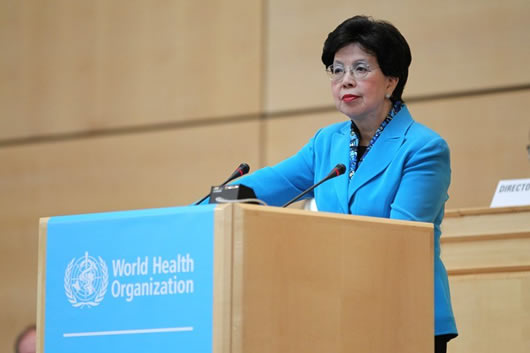
Dr. Margaret Chan
Dr Margaret Chan, Director-General (D-G) of the World Health Organisation (WHO) on Monday said the organisation is creating a single new response programme for health emergencies across the globe.
She said the programme is designed for speed, flexibility and rapid impact with benchmark reactions.
Dr Chan made this known in a speech to the 68th World Health Assembly in Geneva, Switzerland.
She said this could be achieved through the strengthening of national response capacities in partnership with United Nations agencies such as UNICEF and World Food Programme and global bodies such as Red Cross, Red Crescent Societies and Doctors Without Borders.
The D-G said the programme would coordinate the operations of the global emergency workforce with a roster of experienced, competent emergency coordinators in addition to logisticians, medical anthropologists and experts in risk communication.
She announced the establishment of $ 100 million contingency fund with support from member states and financed through flexible voluntary contributions to mitigate emergencies.
“I am developing new business procedures to facilitate rapid and effective response. I do not ever again want to see WHO faced with a situation, it is not prepared, staffed and funded to manage emergencies.”
Dr Chan said WHO’s biggest emergency response is concentrated in West Africa with nearly 1,000 staff in Liberia, Guinea and Sierra Leone for Ebola and responding to the devastating Nepal earthquakes in the coordination of work of more than 150 humanitarian outfits and 130 self-sufficient foreign medical teams.
She said the world is “ill-prepared for an outbreak of such widespread, so severe, so sustained and complexities”.
“The demands on WHO were more than ten times greater than ever experienced in the nearly 70 year history of its existence.”
The D-G said the Ebola outbreak shocked the foundations of WHO to the core giving a historic political moment for world leaders to give it new relevance and empowerment to lead in global health.
She said the Organisation is still driven by fierce commitment to equity, social justice and the right to health.
Source: GNA























